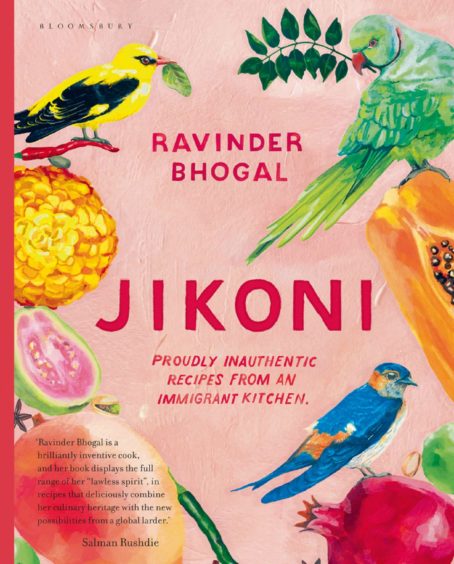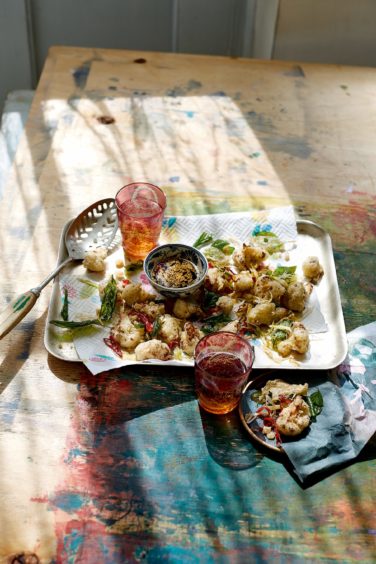
It’s got to the point where many of us are desperate for a change of scene. The sight of the sea on TV has the power to reduce us to tears and we’re scrolling through old holiday snaps mournfully trying to recapture past trips abroad.
Ravinder Bhogal feels that pain. “Travelling is one of my greatest loves and passions. I live to travel – I’m one of those people,” says the author of cookbook Jikoni, which is named after her restaurant.
“I’m really missing travel. I’m missing discovering new things and a lot of my ideas and inspirations come from my travels. I particularly love to go to Asia and to Italy a lot.”
However, the food writer, who was born in Kenya to Indian parents and moved to Britain aged seven, does have a manageable workaround: “Where there’s a lack of travel, there’s always food.”
“The idea of travelling through food is just such a wonderful one,” she continues, noting how her recipes take inspiration from many different far-flung places. “It’s a wonderful way to travel without the air miles.”
During the initial lockdown last spring, Ravinder turned her attention to cooking meals for hospital staff, and charity NishkamSWAT, which supports disadvantaged communities.
Since then, she and her team have been running Comfort And Joy (jikonilondon.com/comfortandjoy), an offshoot of Jikoni, creating vegetarian and vegan meal boxes that will soon be available nationwide.
Adhering to the belief that provides the backbone of Bhogal’s food – cooking without borders, fusing and embracing the ingredients and culinary treasures of different places and traditions – the boxes feature dishes inspired by Thailand and India, East Africa, China, and more.
Dishes like dhal dhokli, a sweet and sour dhal cooked with peanuts and hand-rolled chickpea flour pasta; Kishmish pilau, a fragrant basmati rice cooked with plump sultanas, and crisp aubergine in Sichuan caramel. The boxes can provide respite from the constant hamster wheel of home cooking, and offer a taste of something, and somewhere, else.
Ravinder also finds escape through where she shops for ingredients, which the pandemic restrictions haven’t hampered: “We’re so lucky because Britain is so densely diverse, and there’s always another culture to learn from.
“I’m really inspired by a lot of Asian cookery just because a lot of my travel has happened there. But I think there are a lot of interesting mini-economies of immigrants in this country.”
She describes the Vietnamese supermarkets of London, and how she loves to check out “Sri Lankan shops and discover ingredients that I don’t know, and learning how to cook with those things.
“Often you can adapt those ingredients. You could take orange blossom water from a Middle Eastern shop and make an ice cream flavoured with it.
“So you take the idea of a basic vanilla ice cream and you just put orange blossom in instead of the vanilla, or you make a cream to fill doughnuts.
“I love making ingredients yours; taking something familiar then simply transporting an ingredient into that, to make it surprising and wonderful and new.”
And we could all do with something nutritious, shiny and new right now.
Cauliflower popcorn with black vinegar dipping sauce
Serves: 4 (as a starter)
You’ll need
- 1 cauliflower, cut into small florets
- Small handful of Thai basil leaves
- 6 spring onions, thinly sliced
- 2 red chillies, sliced
- 4 garlic cloves, sliced
- Groundnut oil, for deep-frying
- Lime wedges, to serve
For the dipping sauce:
- 100ml Chinkiang black vinegar
- 80ml light soy sauce
- 1 red chilli, chopped
- Small thumb of ginger, finely grated
- 2 tsp toasted sesame oil
- 1 tsp caster sugar
- 1 tbsp sesame seeds, toasted
For the batter:
- 2 tsp Sichuan peppercorns
- 2 tsp black peppercorns
- 2 tsp sea salt
- 200g plain flour
- 4 tbsp cornflour
- 300ml ice-cold sparkling water
Method
- To make the dipping sauce, simply whisk all the ingredients together.
- For the batter, heat a dry frying pan over medium heat and toast the peppercorns until they are aromatic. Tip into a pestle and mortar, along with the salt, and crush to a coarse powder. Empty out into a mixing bowl, add both flours and mix well. Now whisk in the sparkling water, adding just enough to make a batter with a double-cream consistency, be careful not to overbeat.
- Fill a large, heavy-based saucepan a third full with the deep-frying oil. Heat the oil to 180C – if you don’t have a thermometer, you will know the oil is ready when a cube of bread turns golden brown in 20 seconds. Dip the pieces of cauliflower into the batter, one at a time, letting the excess drip off, and deep-fry until golden. Remove with a slotted spoon and drain on kitchen paper.
- Dip the basil leaves in batter and fry in the same way. When you have finished frying the cauliflower and basil leaves, carefully pour out most of the oil from the pan, leaving just a few tablespoons. Place over medium–high heat and flash-fry the spring onions, chillies and garlic for a minute or so, until the garlic is just beginning to colour. Drain on kitchen paper, scatter over the cauliflower and toss.
- Serve immediately, with lime wedges for squeezing and the dipping sauce alongside.
Jikoni: Proudly Inauthentic Recipes From An Immigrant Kitchen by Ravinder Bhogal, photography by Kristin Perers, Bloomsbury, £26, available now

Enjoy the convenience of having The Sunday Post delivered as a digital ePaper straight to your smartphone, tablet or computer.
Subscribe for only £5.49 a month and enjoy all the benefits of the printed paper as a digital replica.
Subscribe © Kristin Perers/PA
© Kristin Perers/PA © Kristin Perers/PA
© Kristin Perers/PA